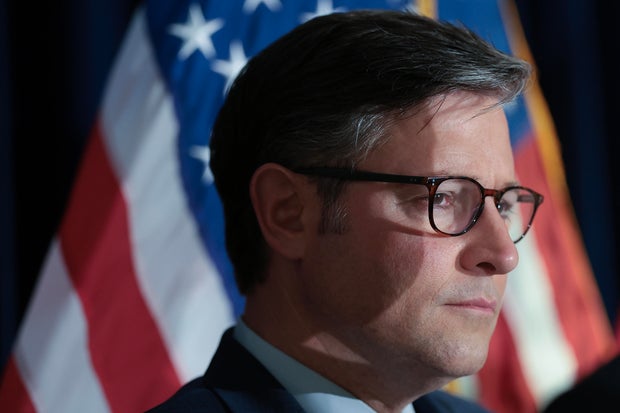Washington — Speaker Mike Johnson unveiled the latest plan to temporarily fund the government on Sunday after Congressional leaders reached an agreement following the House’s rejection of Johnson’s opening gambit last week, with an end-of-month deadline to avert a government shutdown approaching.
“Since we fell a bit short of the goal line, an alternative plan is now required,” Johnson said in a letter to colleagues announcing the new plan on Sunday.
Last week, Johnson moved forward with a vote on a six-month continuing resolution to keep the government funded that was paired with a controversial non-citizen voting measure that Democrats saw as a nonstarter. And with opposition from a small group of House Republicans in the razor-thin GOP majority, the measure fell short of the support necessary for passage.
On Sunday, Johnson outlined that the House will now move forward with a vote on a three-month stopgap measure to keep the government funded without the voting measure attached, teeing up a funding fight ahead of the holidays that has become typical for Congress.
Win McNamee/Getty Images
Johnson said he made the move on Sunday to prevent the Senate from “jamming us with a bill loaded with billions in new spending and unrelated provisions,” saying the three-month continuing resolution is “the only option that remains.”
After the speaker’s plan fell short last week, Senate Majority Leader Chuck Schumer teed up a legislative vehicle for a Senate vote in the event the House is unable to find a path forward. Johnson said in contrast to a Senate-led bill, the House legislation “will be a very narrow, bare-bones [continuing resolution] including only the extensions that are absolutely necessary.”
The legislation also includes around $230 million in additional funding for the Secret Service, which comes after an apparent second assassination attempt against former President Donald Trump. Lawmakers have been considering how to address the funding after the Secret Service said its resources are being stretched thin by heightened protection levels in the aftermath of the first attempt on Trump’s life.
For many House conservatives, who generally oppose continuing resolutions, the new plan represents a situation they hoped to avoid. Johnson acknowledged that it would come as a disappointment to some, but he urged that “it is the most prudent path forward under the present circumstances.”
With such a narrow majority in the lower chamber, Johnson faced few options after he was unable to coalesce House Republicans around the original funding bill, making working across the aisle necessary to avoid a government shutdown. A suggestion by Trump that Republicans should shut down the government if they weren’t able to get the non-citizen voting measure approved further complicated matters for Johnson. But on Friday, the speaker signaled that he expected Trump to soften on his calls for a shutdown.
As history has taught and current polling affirms, shutting the government down less than 40 days from a fateful election would be an act of political malpractice,” Johnson wrote in the letter to colleagues.
Schumer on Sunday criticized Johnson in a statement, accusing the speaker of wasting “precious time” to come to an agreement on how to fund the government, though he celebrated the bipartisan negotiations that he said have occurred over the last four days.
“While I am pleased bipartisan negotiations quickly led to a government funding agreement free of cuts and poison pills, this same agreement could have been done two weeks ago,” Schumer said. “The government will run out of funding just over a week from today. Time is of the essence, and I hope Speaker Johnson and House Republicans will not waste any more time.”
The New York Democrat said he is hopeful both chambers can approve the continuing resolution this week. Congress has until Oct. 1 to fund the government.
House Minority Leader Hakeem Jeffries said in a statement that House Democrats would “evaluate the spending legislation in its entirety in advance of its consideration on the Floor” upon their return to Washington this week.
“Congress is now on a bipartisan path to avoid a government shutdown that would hurt everyday Americans,” Jeffries said.
Nikole Killion,
and
contributed to this report.


